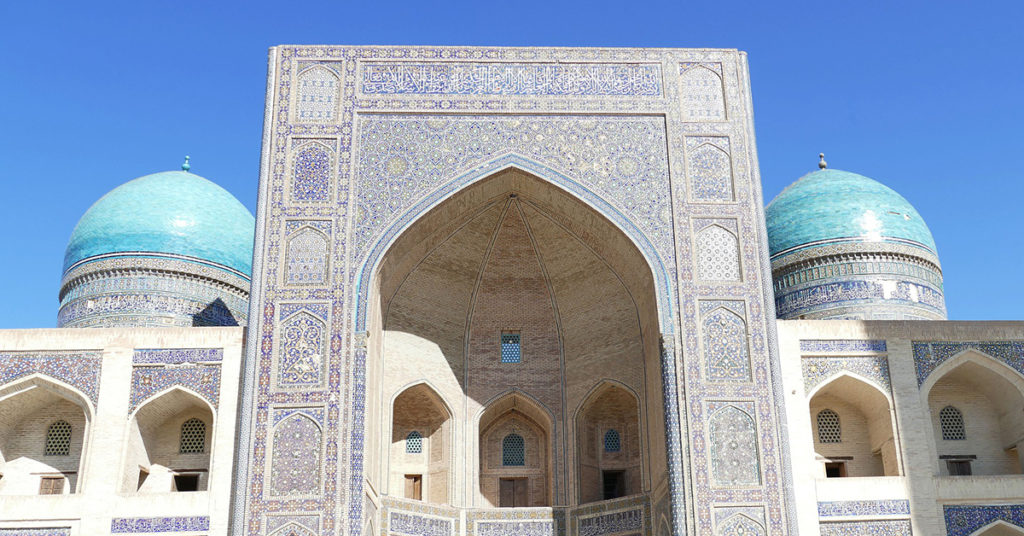His Name:
He is Abū ʿUmar and Abū Ayyūb, Jalāl al-Dīn ibn ʿAbdullāh ibn Dawst ʿAli al-Jamālī from Sindh, Pakistan.
Residence and Date of Birth:
He was born in Sher Khan Jamali; a village in Nawabshah, Sindh. Shaykh Jalāl al-Dīn was born in the year 1916 (1334 A.H) according to his passport. However, the majority believe he was born prior to this date. Even at this age the Shaykh would write, read without glasses.
Teachers:
▪ His father; Shaykh ʿAbdullāh
He studied the Holy Qur’ān under his guidance.
▪ Shaykh Qārī Ramaḍān
He also studied the recitation of Holy Qur’ān under his guidance.
▪ Shaykh ʿUbaydullāh al-Sindī (1289AH-1363AH)
Shaykh Jalāl al-Dīn read Ṣaḥīh al-Bukhārī, Ṣaḥīh Muslim, Jāmiʿ Tirmidhī, Shamā’il al-Tirmidhī, parts of Sunan Abū Dāwūd, Sharḥ al-Jāmiʿ and al-ḥadith al-musalsal bi al-awwaliyyah with him in Bir Janhada; a village in Hyderabad, Sindh. Shaykh Jalāl al-Dīn received ijāzah ʿāmmah (general license) from Shyakh ʿUbaydullāh but due to some illness, he was unable to complete the program. He returned to his family and after a brief period left to another seminary to complete his study.
▪ Shaykh Muḥammad Jamīl Aḥmad Khayrpūrī
He read Muwaṭṭa’ Muḥammad under his guidance.
▪ Shaykh Muḥammad Khalīl al-Khayrpūrī
He read Ṣaḥīh al-Bukhārī, Ṣaḥīh Muslim, Sunan Nasā’ī, Sunan Abū Dāwūd, Shamā’il al-Tirmidhī and Mishkāt al-Maṣābīḥ under his guidance.
▪ The author of Aḥsan al-Fatāwā; Shaykh Rashīd Aḥmad Ludyānwī
▪ Shaykh Gulām Ḥusayn Jamālī
He studied Ḥanafī Fiqh and Uṣūl, Shamā’il al-Tirmidhī, Alfiyyah ibn Mālik under his guidance.
▪ Shaykh Jalāl al-Dīn met Shaykh Ashraf ʿAli Thānawī and attended his majlis. However, he did not receive any ijāzah from him.
▪ Shaykh Jalāl al-Dīn benefited from Shaykh Tāj Maḥmūd Amrūthī (1347AH).
▪ He received khilāfah from Shaykh Ḥammād Hālijwī.
Teaching:
The Shaykh has taught various books of ḥadīth, fiqh and other subjects for many years. He taught Ṣaḥīh al-Bukhārī for 40 years and he specialised in Iftā’ (Islamic Jurisprudence).
Written Works:
▪ Tafsīr of 10 ajzā’ till Sūrah Yūnus.
▪ Translation of Al-Durr Al-Manthūr fī al-Tafsīr bi al-Ma’thūr by Imam Jalāl al-Dīn al-Suyūṭī in Sindhi language.
▪ Al-Fatwā (legal issues)
▪ Translation of parts of Ṣaḥīh al-Bukhārī with commentary in Sindhi language.
▪ Biography of Shaykh al-Sindī, Shaykh Khalīl Aḥmad, Shaykh Ḥammād Hālijwī.
▪ Medicine and Wisdom. [1]معجم الشيوخ للشيخ صفوان الداودي المدني؛ ص 90-93.

Was Shaykh Jamīl Khayrpūri And Shaykh Khalīl Khayrpūri Students of Shaykh Rashīd Aḥmad Gangohī?
Our beloved teacher, Shaykh Abū Bakr Mohammed Daniel; founder of Cordoba Academy said:
‘During my stay in Sindh, I spent most of my time with Shaykh (Jalāl al-Dīn), and as is my practice before reading with any very old scholar, I spent a considerable amount of time with him recording his biography.
In this time, Shaykh informed me that he studied the Ṣaḥīḥ of Imām al-Bukhārī and the Jāmiʿ of Imām al-Tirmidhī with the renowned scholar Shaykh ʿUbaydullāh ibn Islām al-Sindī. He also received ijāzah ʿāmmah (general license) from the Shaykh, but due to some illness, he was unable to complete the program. He returned to his family and after a brief period left to another seminary to complete his study. There he studied the major works with three brothers who taught in a madrasah in Sindh. The names of the brothers were Jamāl Aḥmad, Rashīd Aḥmad, and Khalīl Aḥmad.
I was intrigued to know who these scholars were and who they had studied with. When I enquired, I was repeatedly told in no uncertain terms that two of them were the students of the renowned reformer Maulana Rashīd Aḥmad al-Gangohī (1323 AH). I asked the Shaykh’s son (who is himself a scholar) to verify that I was not mistaken and that this was in fact the same Rashīd Aḥmad and not a namesake.
He confirmed to me that the brothers had indeed travelled to India and studied there with Maulana Rashīd Aḥmad al-Gangohī. I then asked the Shaykh to describe to me the physical appearance of his three shuyukh in an attempt to establish their ages. He informed me that the eldest of them (Shaykh Khalil Aḥmad) was “elderly and white of beard”.
As I had previously not encountered any scholar who had studied with Shaykh Khalīl Aḥmad nor was I aware of the scholar’s biography, I was left with no choice, but to depend on the physical description given to me to estimate his age.
I calculated that if Shaykh Jalāl al-Dīn was at least (conservatively) 100 years of age in (1435 AH) and his shaykh was aged at least 45, then there was muʿāṣārah (lifespan overlap) and it was very possible that Shaykh Khalīl did in fact study with Shaykh Rashīd Aḥmad al-Gangohī who died 112 years earlier. This was also supported by the fact the other teacher of Shaykh Jalāl al-Dīn (Shaykh ʿUbaydullāh al-Sindī) definitely did study with Shaykh Rashīd Aḥmad Gangohī.
However, in order to reach the truth of the matter, I requested a scholar proficient in Urdu to follow up and ask specific questions of the Shaykh’s son. At the same time, I contacted some scholars in Pakistan for more information about Shaykh Khalīl Aḥmad. At the end of my research, I was very startled to learn that at least three different versions existed for the biographical details of the scholars.
One version said the brothers studied in Deoband with Shaykh Ḥusayn Aḥmad Madanī, another was that they studied somewhere in Gujarat and the earliest version, which I had heard, was that they studied with Shaykh Rashīd Aḥmad Gangohī. It then became apparent to me that there was iḍṭirāb (incongruity) between the biographical details that each of us had received.
The source of this appears to be the Shaykh’s son, who perhaps due to his own old age, seems to have been “confused”. The problem we have now is that we cannot be sure who this elderly teacher (Shaykh Khalīl Aḥmad) actually studied with and until we can establish this it is better to leave this chain.
In spite of this confusion, I have always been certain, that the Shaykh studied with and received ijāzah from Shaykh ʿUbaydullāh al-Sindī as he informed me of this himself and during my trip to Sindh, I met several other scholars who also informed me that they had studied the same works with Shaykh ʿUbaydullāh al-Sindī رحمهم الله.’
Shaykh Ḥafiẓ Ẓahūr Aḥmad al-Ḥusaynī mentioned:
‘There were three brothers. Muftī Rashīd Aḥmad Ludyānawi who studied at Deoband under Shaykh Ḥusayn Aḥmad al-Madanī.
The eldest brother; Shaykh Khalīl studied at Jāmiʿah Islāmiyyah, Dabhel in the year 1939-1358AH. At the end of the book; Tārikh Jāmiʿah Islamiyyah, Dabhel (history of Dabhel university), the names of all the graduates are mentioned according to the year of graduation. Shaykh Khalīl is mentioned in the year 1358 as “Muhammad Khalil Multānī”. He studied under Shaykh ʿAbd al-Raḥmān al-Āmrūhī (d.1367- 1947); a student of Shaykh Qāsim al-Nānūtwī (1832-1880); an associate of Shaykh al-Gangohī (1826-1905).
Shaykh Jamīl was younger than Shaykh Khalīl which creates confusion. Therefore, this chain will be unreliable and better to abstain from. The best path is through his teacher; Shaykh ʿUbaydullāh al-Sindī.’
The following is the text from the book Tārīkh Jāmiʿah Islāmiyyah, Dabhel:


Shaykh ʿUbaydullāh al-Sindī (1872-1944):
He was born on 10 March 1872 night of Jumuʿah, 12th Muharram 1289AH to a Sikh family in the district of Sialkot, Punjab. He converted to Islām at age 16 and chose “ʿUbaydullāh al-Sindī” as his new name, and later enrolled in the Dār al-ʿUlūm Deoband 1306AH, where he studied with Shaykh Rashīd Aḥmad al-Gangohī and Shaykh al-Hind Maḥmūd al-Ḥasan.[2]التمهيد لتعريف أئمة الدين، 8-10.
His Teachers:
▪ Shaykh Rashīd Aḥmad al-Gangohī (1826-1905).
He studied majority of Sunan Abū Dāwud under him and completed the rest with his students like Shaykh ʿAbd al-Karīm Dehlawī and Shaykh ʿAbd al-Razzāq al-Afghānī. Shaykh al-Sindī did not receive ijāzah ʿāmmah (general license) from Shaykh Gangohī.
▪ Shaykh al-Hind Maḥmūd al-Ḥasan (1851-1920).
He studied majority of Jāmiʿ al-Tirmidhī and other ḥadīth works such as Musnad Aḥmad, Sharḥ Maʿāni al-Āthār, Kitāb al-Athar, Tafsīr al-Bayḍāwī, al-Hidāyah (ḥanafī fiqh), al-Tawdīḥ wa al-Talwīḥ, al-Muṭawwal Sharḥ al-Talkhīṣ and other works. He received ijāzah ʿāmmah (general license) from him in the year 1308AH.
▪ Shaykh Ḥusayn ibn Muḥsin al-Anṣārī al-Yamanī (1830-1909).
He had very high chains through the scholars of Yemen and Ḥijāz. Shaykh al-Sindī read numerous works to him in various sciences including ḥadīth, shāfiʿī fiqh, parts of Fatḥ al-Bāri and Nayl al-Awṭār.
▪ The grand Musnid of his time, Ḥāfiẓ ʿAbd al-Ḥayy al-Kettānī (1884-1962).
He heard al-ḥadith al-musalsal bi al-awwaliyyah.
▪ Shaykh Abū al-Khayr ʿAṭṭār al-Makkī al-Hindī (1860-1916)
He took al-Musawwā; a commentary on Muwaṭṭa’ by Shah Walī Allāh al-Dehlawī and gained ijāzah (license) and munāwalah (giving someone the written material to transmit).
▪ Shaykh Nadhīr Ḥusayn al-Dehlawī (1805-1902); the student of Shāh Muḥammad Isḥāq.
Shaykh al-Sindī attended his lecture on Ṣaḥīh al-Bukhārī and Jāmiʿ al-Tirmidhī. He was included in the ijāzah of the Shaykh.
Note: Shaykh al-Sindī mentions that he was included in al-ijazah li ahl al-ʿaṣr (license for the people of his time) of Shaykh Nadhīr Ḥusayn. [3]حضرت بعض دروسه في الجامع الصحيح للإمام البخاري وجامع الترمذي وشملتنني إجازته العامة لاهل عصره، (التمهيد … المزيد
This form of ijāzah is debatable and many great ḥadīth scholars refrained from it such as Ḥafiẓ al-ʿIrāqī, Ḥafiẓ Ibn Ḥajar, Ḥafiẓ Sakhāwī and others. [4]النَّوعُ الثَّالِثُ مِنْ أنواعِ الإجَازَةِ: أنْ يُجِيْزَ لغَيْرِ مُعَيَّنٍ بِوَصْفِ العُمُومِ، مِثْلُ أنْ … المزيد
However, Shaykh al-Sindī was also included in the general ijāzah for all those who studied with him. This form of ijāzah is valid and reliable. [5]فإنْ كَانَ ذَلكَ مُقَيَّداً بوَصْفٍ حاصِرٍ أوْ نحوِهِ فَهوَ إلى الجوَازِ أقرَبُ. (مقدمة ابن صلاح،154، شـ عتر) … المزيد
The following is the Ijāzah of Shaykh Nadhīr Ḥusayn:
ولكل من أخذ عني


Shaykh Jalāl al-Dīn’s chain (sanad) via Shaykh ʿUbaydullāh al-Sindī:
The most common and highest chain of narration for Ṣaḥīh al-Bukhārī through oral transmission (samāʿ) amongst the Deobandi scholars belongs to the students of:
- Shaykh Ḥusayn Aḥmad al-Madanī (1879-1957) such as:
Pakistan: Shaykh ʿAbd al-Ḥalīm Chishti and others.
India: Shaykh Niʿmatullāh al-Aʿẓamī, Shaykh Bilāl al-Aṣghar, Shaykh ʿAbd al-Ghaniy al-Azharī and others.
UK: Shaykh Yaʿqāb al-Qāsimī (Dewsbury), Shaykh ʿAbd al-Ḥaqq Saʿīd (Birmingham) and others.
- Or Shaykh Fakhr al-Dīn Murādabādī (1889-1972) such as:
Shaykh Muṣliḥ al-Dīn al-Qāsimī (Dewbury), Shaykh Thamīr al-Dīn (Manchester), Shaykh Farīd al-Dīn al-Masʿūdī (Bangladesh), Shaykh Aḥmad Khayrānī (Malaysia), Shaykh Muḥammad Abū Layth al-Khayrabādī (Malaysia), and others.
- Shaykh Ḥusayn al-Madanī, Shaykh Fakhr al-Dīn, Shaykh ʿUbaydullāh al-Sindī and others who have full oral transmission (samāʿ kāmil) from:
- Shaykh al-Hind Maḥmūd al-Ḥasan (1851-1920) who has samāʿ kāmil from:
- Shaykh Muḥammad Qāsim al-Nānūtwī (1832-1880) who has samāʿ kāmil from:
- Shaykh Shāh ʿAbd al-Ghaniy al-Dehlawī (1820-1879) who has samāʿ kāmil from:
- Shaykh Shāh Muḥammad Isḥāq al-Dehlawi (1783-1846).
Alternative Higher Chain:
- Shaykh Jalāl al-Dīn (before 1916-2021) who has samāʿ kāmil from:
- Shaykh ʿUbaydullāh al-Sindī (1872-1944) who has partial samāʿ from:
- Shaykh Nadhīr Hussain al-Dehlawī (1820-1879) who has samāʿ kāmil from:
- Shaykh Shāh Muḥammad Isḥāq al-Dehlawī (1783-1846).
Narrating from Shaykh Jalāl al-Dīn is as though one has taken from Shaykh ul-Hind in oral transmission (samāʿ kāmil). However, due to the partial samāʿ between Shaykh ʿUbaydullāh al-Sindī and Shaykh Nadhīr Dehlawi this chain will not be more superior; both chains have their own value. The first having full samāʿ in each generation and latter being of a higher chain. [6][فإن تميز] الإسناد النازل [بفائدة] كزيادة الثقة في رجاله على العالي، أو كونهم أحفظ أو أفقه، أو كونه متصلا … المزيد
Yamanī Chain (sanad) to Imam al-Shawkānī:
- Shaykh Jalāl al-Dīn (before 1916-2021)
- Shaykh ʿUbaydullāh al-Sindī (1872-1944)
- Shaykh Ḥusayn ibn Muḥsin al-Anṣārī al-Yamanī (1830-1909)
- Shaykh Aḥmad ibn Muḥammad al-Shawkānī (1814 – 1864)
- Shaykh Muḥammad ibn ʿAli ibn Muḥammad ibn ʿAbdullāh al-Shawkānī (1759-1834)
Benefiting from Shaykh Jalāl al-Dīn:
With the grace of Allāh ﷻ and efforts of Cordoba Academy, many students benefited from Shaykh Jalāl and read various works of ḥadīth such as Ṣaḥīh al-Bukhārī, Ṣaḥīḥ Muslim, Jāmiʿ al-Tirmidhī, Sunan Abū Dāwūd, Shamā’il al-Tirmidhī, Kitāb al-Āthār, parts of Tafsīr al-Bayḍāwī and other works. Though such programs, his legacy was spread far and wide left to countless students worldwide who will continue to make adʿiyah for him and continue to spread his legacy.
Demise of Shaykh:
Our beloved Shaykh Jalāl passed away and returned to Allāh ﷻ on Saturday 24th July 2021, 14th Dhū al-Ḥijjah 1442 at around 5am in Pakistan. Innā lillāhi wa innā ilayhi rājiʿūn. May Allāh forgive him, show him mercy, grant him security, pardon him and grant him a noble provision and a spacious lodging. May He wash him with water, snow and ice and purify him from sins as He has purified white garments from filth.
May He give him a better abode in place of his present one, a better family in place of his present one, and a better spouse in place of his present one. May Allāh admit him into the highest levels of Jannah among the ṣāliḥīn, ṣiddīqīn and shuhadā’. And may He preserve him from the trials in the grave and the punishment of the Fire. Āmīn.
Shaykh’s Ijāzah to His Students:


Taken from the fawā’id of our beloved teacher:
Shaykh Mohammed Daniel al-Muhājir al-Dimashqī;
Founder of Cordoba Academy.
www.cordobaacademy.com
الحاشية[+]
| ↑1 | معجم الشيوخ للشيخ صفوان الداودي المدني؛ ص 90-93. |
|---|---|
| ↑2 | التمهيد لتعريف أئمة الدين، 8-10. |
| ↑3 | حضرت بعض دروسه في الجامع الصحيح للإمام البخاري وجامع الترمذي وشملتنني إجازته العامة لاهل عصره، (التمهيد لتعريف ائمة التجديد، 13). |
| ↑4 | النَّوعُ الثَّالِثُ مِنْ أنواعِ الإجَازَةِ: أنْ يُجِيْزَ لغَيْرِ مُعَيَّنٍ بِوَصْفِ العُمُومِ، مِثْلُ أنْ يَقُولَ: أجَزْتُ لِلْمُسْلِمِينَ، أوْ أجَزْتُ لِكُلِّ أحَدٍ، أوْ أجَزْتُ لِمَنْ أدْرَكَ زَمَانِي، ومَا أشْبَهَ ذَلِكَ، فَهذا نَوعٌ تَكَلَّمَ فيهِ المتأخِّرُونَ مِمَّنْ جَوَّزَ أصْلَ الإجَازَةِ واخْتَلَفُوا في جَوَازِهِ. (مقدمة ابن صلاح،154، شـ عتر). (وقال العراقي): وفي النفس من ذلك شيء، وأنا أتوقف عن الرواية بها، وقال في نكته: والاحتياط ترك الرواية بها، بل نقل شيخنا (ابن حجر) عدم الاعتداد بها عن متقني شيوخه، ولم يكن هو أيضا يعتد بها، حتى ولو كان فيها بعض خصوص، كأهل مصر اقتناعا بما عنده من السماع والإجازة الخاصة، ولا يورد في تصانيفه بها شيئا، ويرى هو وشيخه أن الرواية بإسناد تتوالى فيه الأجايز، ولو كان جميعه كذلك، أولى من سند فيه إجازة عامة، كما سيأتي في النوع التاسع. وقال في توضيح النخبة له: إن القول بها توسع غير مرضي، لأن الإجازة الخاصة المعينة مختلف في صحتها اختلافا قويا عند القدماء، وإن كان العمل استقر على اعتبارها عند المتأخرين، فهي دون السماع بالاتفاق، فكيف إذا حصل فيها الاسترسال المذكور، فإنها تزداد ضعفا، لكنها في الجملة خير من إيراد الحديث معضلا. (فتح المغيث، 2، 76-77، العلمية). فلا عِبْرَةَ بذلك؛ كالإِجَازَةِ العَامَّةِ في المُجازِ لهُ، لا في المُجازِ بهِ، كأَنْ يقولَ: أَجَزْتُ به لجَميعِ المُسلمينَ، أَو: لمَنْ أَدْرَكَ حَياتِي، أَو: لأَهْلِ الإِقليمِ الفُلانيِّ، أَو: لأهْلِ البَلدةِ الفُلانيَّةِ وهُو أَقربُ فلا عبرة بذلك؛ كالإجازة العامة في المجاز له، لا في المجاز به، كأن يقول: أجزت به لجميع المسلمين، أو: لمن أدرك حياتي، أو: لأهل الإقليم الفلاني، أو: لأهل البلدة الفلانية، وهو أقرب (أي لأهل بلد معين، أو إقليم معين) إلى الصحة؛ لقرب الانحصار. (نزهة النظر، 125، شـ عتر). |
| ↑5 | فإنْ كَانَ ذَلكَ مُقَيَّداً بوَصْفٍ حاصِرٍ أوْ نحوِهِ فَهوَ إلى الجوَازِ أقرَبُ. (مقدمة ابن صلاح،154، شـ عتر) تقدم أن المصنف اختار عدم صحة الإجازة العامة وقال في هذه الصورة منها أنها أقرب إلى الجواز فلم يظهر من كلامه في هذه الصورة المنع أو الصحة والصحيح في هذه الصورة الصحة فقد قال القاضى عياض في كتاب الإلماع ما أحسبهم اختلفوا في جوازه ممن تصح عنده الإجازة ولا رأيت منعه لأحد لأنه محصور موصوف كقوله لأولاد فلان أو أخوة فلان. (التقيد والإيضاح، 153، شـ الطباخ). |
| ↑6 | [فإن تميز] الإسناد النازل [بفائدة] كزيادة الثقة في رجاله على العالي، أو كونهم أحفظ أو أفقه، أو كونه متصلا بالسماع، وفي العالي حضور أو إجازة أو مناولة، أو تساهل بعض رواته في الحمل ونحو ذلك (فهو مختار). (تدريب الراوي، 2، 620، ش الفرايابي). |




